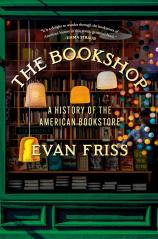The Bookshop: A History of the American Bookstore
Review
The Bookshop: A History of the American Bookstore
On a Saturday morning in May 2006, I boarded a chartered bus for the three-and-a-half-hour drive from my home in Harrisburg, Pennsylvania, to New York City. The trip was the brainchild of my friend, Larry Portzline, the creator of a new travel experience he called “bookstore tourism.” When we arrived in New York, the bus dropped us off in Greenwich Village.
With maps showing the locations of all the bookstores clustered there, we happily spent the day browsing shops that included Three Lives & Company and The Strand. On the ride home, shopping bags stuffed with books in hand, we watched the Tom Hanks/Meg Ryan valentine to bookstores, You’ve Got Mail. I’m smiling as I recall how enjoyable that day was and, sadly, how quickly the hours passed.
For me, THE BOOKSHOP was the next best thing to reliving that trip. In it, Evan Friss, a professor of history at James Madison University, leads readers on his own thoroughly researched and entertaining popular history of the American bookstore. It’s one that begins in Benjamin Franklin’s Philadelphia print shop in 1728 and ends in Nashville at Parnassus Books, the highly successful bookstore co-owned by bestselling novelist Ann Patchett.
"Friss seasons each of his lively portraits with brief concluding sidebars that highlight some aspect of the bookselling business or one of its distinctive characters.... There’s something here guaranteed to evoke a warm memory in every bibliophile."
In each of the chapters that separate those profiles, Friss tells the story of a different “bookstore” (a flexible definition that embraces a chapter on mobile bookselling and one on the sidewalk booksellers of New York City). As he explains, “[B]ookstores reflect the cultural, intellectual, economic, and political world around them, and they are also actors, institutions that cast their own shadows.” His is also a story of the ways booksellers have demonstrated ingenuity and persistence in the face of the economic and cultural challenges of their times, most recently ones as disparate as Amazon’s online bookselling behemoth and the COVID pandemic.
Friss readily admits that THE BOOKSHOP could not possibly offer even a glimpse of every American bookstore worth writing about (Portland’s Powell’s Books and Denver’s Tattered Cover are mentioned only in passing, and I’d be remiss if I didn’t bring up the Midtown Scholar, the fine independent bookstore here in Harrisburg). Nonetheless, he does a fine job telling the stories of some iconic places in the history of American bookselling, including New York’s The Strand and Gotham Book Mart, as well as Chicago’s Marshall Field & Company, a giant in the days when major department stores featured thriving book departments.
In each case, Friss also devotes considerable attention to the distinctive personalities who put their imprint on these outlets --- Fred Bass, his daughter Nancy Bass Wyden, and their celebrated clerk Burt Britton at The Strand; Frances Steloff, who founded Gotham in 1920 and ran it for 47 years; and Marcella Burns Hahner, the Marshall Fields “Czarina” for 27 years. In different ways, each was a shrewd and innovative business mind, but the product they were selling lent a unique flavor to that commerce.
With the story of Greenwich Village’s Oscar Wilde Memorial Bookshop, Friss offers a dramatic example of how a bookstore can be much more than a place where books are sold. Opened in 1967 by Craig Rodwell, what Friss calls “one of the world’s most remarkable bookshops” became a vibrant center of gay rights activism --- “a space that fomented political change” --- especially in the aftermath of the Stonewall protests in 1969. That was true to a lesser extent of Drum & Spear, a Black “movement bookstore” that opened in Washington, DC in the summer following the assassination of Martin Luther King Jr. and the riots that devastated the neighborhood where it set up shop.
Friss devotes a chapter to the elephant in the room, Amazon, and its own brief (seven-year), unsuccessful venture into the world of brick-and-mortar bookselling. While he shares some of the grim statistics about the demise of independent bookstores in the wake of Amazon’s rise (between 1995 and 2001, 43 percent of the indies disappeared), he’s also quick to point to numbers like the 27 percent rise in the number of bookstore locations that were members of the American Booksellers Association in the five years after Parnassus Books opened in 2011 that seem to counteract the doomsayers. And yet, he admits, “competing narratives can’t decide whether indies are dying or multiplying.”
Friss seasons each of his lively portraits with brief concluding sidebars that highlight some aspect of the bookselling business or one of its distinctive characters. Among them are a tribute to Vaughn, the UPS driver at Three Lives & Company, where Friss’ wife once worked as a bookseller; a sketch of Mitchell Kaplan, founder of Books & Books in Coral Gables, Florida --- whom Friss calls “the Convener” for his effort to create a gathering space “where readers could become educated and inspired” --- and Donna Paz Kaufman, who runs seminars for aspiring bookstore owners in the bookstore she and her husband own in Amelia Island, Florida.
There’s something here guaranteed to evoke a warm memory in every bibliophile. For me, it’s the hours I’ve spent browsing in bookshops with my good friend, the prominent golf writer Lorne Rubenstein. Among other stops, we’ve passed many pleasant hours in bookstores in his hometown of Toronto and the tiny Scottish Highlands town of Dornoch he’s written about in one of his own books. We also drop in annually to Chuckles Favorite Things, an utterly indescribable used book/antique shop combination in Stuart, Florida. In a Barnes & Noble in Pennsylvania, Lorne once told me that he’d “rather read than eat.” If that describes you, THE BOOKSHOP is a book you will cherish.
Reviewed by Harvey Freedenberg on August 23, 2024
The Bookshop: A History of the American Bookstore
- Publication Date: August 6, 2024
- Genres: History, Nonfiction
- Hardcover: 416 pages
- Publisher: Viking
- ISBN-10: 0593299922
- ISBN-13: 9780593299920




